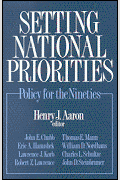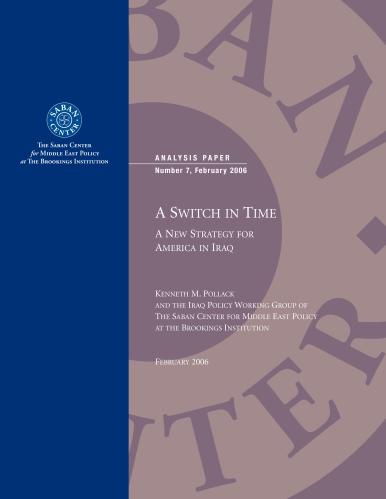Here’s week five of what Brookings experts are saying in the first 100 days about the Trump administration’s policy choices, personnel decisions, and engagements with global and domestic events. To receive daily updates on new Brookings research, commentary, and events, subscribe to our newsletters.
Read what Brookings experts had to say about the First 100 Days in: Week Four | Week Three | Week Two | Week One.
ON EUROPE AND THE MUNICH SECURITY CONFERENCE
Bruce Jones, vice president and director of Foreign Policy, comments on speeches made by Vice President Mike Pence and Defense Secretary James Mattis at the recent Munich Security Conference. They both reinforced America’s commitment to Europe and NATO, Jones says, but adds that “what would have helped was any evidence that Trump himself noticed that this was happening.”
Jones also reported on what Israeli Defense Minister Avigdor Liberman had to say about President Trump’s comments on the two-state solution approach to the Israeli-Palestinian conflict; and also shares what a former Saudi intelligence chief and Qatar’s former prime minister had to say about the Iran nuclear deal.
On asking NATO member countries to meet their 2 percent of GDP defense spending targets, Jones explains why “the whole conversation rather completely misses the point.”
Constanze Stelzenmüller, the Robert Bosch Senior Fellow at Brookings, calls the Munich Security Conference “a watershed moment” for the alliance, and that despite assurances from top U.S. officials, Europeans “are left to wonder which narrative of Europe will win out in Washington: “the benign version of an alliance that is necessary but needs upgrading—or the dystopian vision of an undemocratic leviathan that is inimical to U.S. trade and security interests and needs to be disaggregated.”
Nonresident Senior Fellow Jeremy Shapiro asks what Europeans should “make of a U.S. administration whose president regularly tweets out bile against U.S. allies, but whose cabinet officials seek to calm alliance gatherings with the dulcet tones of the foreign policy establishment?” The “main point to remember is that only the president can make foreign policy,” he adds.
MORE ON FOREIGN POLICY & NATIONAL SECURITY
The Brookings Order from Chaos Task Force—a group of Republican and Democratic foreign policy experts—have released their report “Building ‘Situations of Strength’: A National Security Strategy for the United States.”
William McCants, senior fellow and director of the project on U.S. Relations with the Islamic World, says National Security Advisor Lt. Gen. H.R. McMaster’s “nuanced views” on Islam and jihadism “will likely be at odds with those of the president’s chief political strategist, Steve Bannon” and other Islamophobes. “And that’s a good thing.”
Senior Fellow Michael O’Hanlon and David Gordon write that “while [Trump’s] domestic policy ideas seem quite outside the mainstream, his national security team is performing much better than it is being given credit for.”
Nonresident Fellow Sarah Yerkes reflects on the February 15 meeting between President Trump and Israeli PM Benjamin Netanyahu, saying that “Trump’s remarks were at best incoherent, at worst counter to the interests of Netanyahu and his coalition. Netanyahu’s supporters in Israel and the United States should view the meeting with caution, not celebration.”
The Center for 21st Century Security and Intelligence at Brookings recently hosted two events: a panel of experts on defense recommendations for the Trump administration; and General Joseph Dunford, chairman of the Joint Chiefs of Staff on Department of Defense requirements and American national security priorities.
Joshua Meltzer and Dany Bahar from the Global Economy and Development program say that U.S. trade with Mexico under NAFTA “led to little over 100,000 manufacturing net job losses—equivalent to about 0.1 percent of the U.S. labor force.” They argue that “the administration should instead focus on better assisting people who lose their jobs—whether due to trade, technology, or productivity gains – to find new work.”
ON DOMESTIC & ECONOMIC POLICY
Senior Fellow Isabel Sawhill writes that “Current job growth has nothing to do with [President Trump’s] policies.” She argues that “we should err on the side of additional job creation until it is very clear that inflation, and expectations of inflation, are substantially above the Fed’s two percent target rate.”
Senior Fellow John Hudak breaks down the issues in the marijuana debate for the new administration, including important points on medical marijuana and recreational marijuana.
Vanessa Williamson, a fellow in Governance Studies, compares Tea Party activism that erupted early in President Obama’s first term with the tactics of protests observed around the country in congressional town halls.
Visiting Fellow Andrew Feldman and Demetra Nightingale of the Urban Institute write that President Trump bringing a business-like approach to government “will require much more information from rigorous program evaluation to determine what is working, what is not, and how programs can be improved.”
Nonresident Senior Fellow Marvin Kalb, a distinguished journalist, says that President Trump “seeks to humiliate journalists, to belittle them, to discourage their criticism, to emasculate the ‘fourth branch of government’ … to rob it of the legitimacy it used to enjoy among many Americans” so that he “can govern as he wishes.”
Nonresident Senior Fellow Stuart Brotman looks at Supreme Court justice-nominee Neil Gorsuch’s record on regulatory power, particularly the Federal Communications Commission. “Gorsuch clearly represents a philosophy that is more skeptical of regulatory overreach,” Brotman writes, “and more deferential to Congress.”
Jessica Brandt, associate fellow in Foreign Policy, explains that the Ninth Circuit court’s ruling to uphold a temporary restraining order on President Trump’s original refugee and immigration order was silent on the authorization Trump’s order gave to state and local governments to exercise greater power over refugee resettlement. “If empowered,” Brandt says, “governors could resist accepting refugees into their jurisdictions. That could hobble the nation’s resettlement program.”
Blair Levin, in a recent 5 on 45 podcast, anticipates how the Trump administration will tackle broadband policy, net neutrality, the role of the FCC, and more.
Christine Stenglein and Stephen Hess of Governance Studies offer headlines that capture how President Barack Obama fared during his first 100 days in office in 2009. “Turmoil and uncertainty are part of any presidential transition,” they write, “particularly when power switches between parties.”
—
For more details policy recommendations and analyses from Brookings experts for the new administration, see “Brookings Big Ideas for America” on issues including the threatened middle-class dream in America, health care, criminal justice reform, infrastructure, U.S. alliances, nuclear weapons, terrorism, and regional conflicts.




Commentary
President Trump’s First 100 Days: What Brookings experts are saying, 2/24/17
February 24, 2017